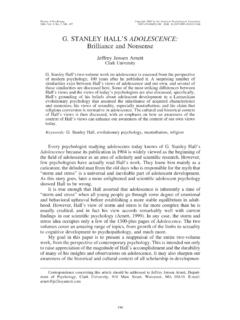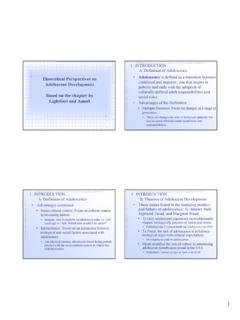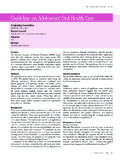Transcription of Is it Time to Reconsider the Notion of 'Adolescence'?
1 Is It Time to ReconsiderIs It Time to ReconsiderIs It Time to ReconsiderIs It Time to Reconsiderthe Notion of adolescence ?the Notion of adolescence ?the Notion of adolescence ?the Notion of adolescence ?Could we perhaps get further dealing with the problems of adolescents if we got ridof the whole Notion of adolescence ?Clearly, it s a fairly recent Notion .. of having a separate time of life, almost aseparate group of people, age 12 to the early 1900s there was childhood and adulthood. There were big transitionsto be made in growing-up, of course. But young people did move into the adultworld without this stage in-between: no longer children, but not yet treated as adults .. behaving like adults but not given serious work to do; expected basically to go toschool .After the 19th century, when children were treated so badly, there was anunderstandable impulse to give them a real childhood free from work.
2 Lessdefensible, perhaps, is the belief that prolonging childhood is a good thing in institution adolescence is now in serious rethinking was visible when Theodore Sizer s colleagues and friends gathered atBrown University to commemorate his lifetime of work with young people. Plannedfor months, it took place less than two weeks after the shootings at Columbine HighSchool touched off a national discussion about what s gone wrong? .Sizer was a young dean of the Harvard Graduate School of Education; thenheadmaster of Phillips Andover, then the author of the Horace books about highschools, then head of the Annenberg Institute at Brown. Today he and his wife areco-principals of a charter school in Devens friends are people who ve devoted their lives to helping kids by changing schools;to developing smaller schools, in which kids become secure adults, devoted to theidea that the object of education is to teach young people to use their minds important things were said, that suggest the question is partly what (good)school is; but partly, too, whether formal education ought to be the only route toadvancement for Adults have disappeared from the lives of adolescents, said Deborah Meier, founderof the Central Park East school in New York City.
3 We have deliberately created(schools) in which it is impossible for adults to know kids well. Kids know no one buttheir peers. And all this gets worse the closer kids get to adulthood. We have created a separate society for adolescents, said Sheldon White, professorof psychology at Harvard. adolescence not even a concept until about 100 yearsago was a coming-together of the child-labor laws, the new high schools and thespecial legislation for juvenile offenses. In whose interest was adolescence invented? , someone said: We assumed it was in the public interest to get kids out of the this ought to be reappraised. Maybe we ought to re-invent child labor. Young people do work, as someone pointed out. But not so they can advance: Theywork so they can be marketed-to, as consumers. adolescence did also create millionsof jobs for adult professionals: social workers, teachers, others; as White get a perspective on the current Notion that education-is-the-only-way-up youreally have to go back in history.
4 Look, for example, at what Paul Johnson, a Britishpopular historian, wrote in The Birth of the Modern about what was accomplished inthe years after 1815 by people who came from truly disadvantaged backgrounds, whowent to work early and who had almost no formal Michael Faraday, the scientist, was born poor, the son of a Yorkshire had no education other than a few years at a school for the poor, but as abookbinder s apprentice he read the works he bound .. o John Otley, the geologist, had no education apart from village schooling and set upas a James Naysmith, the engineer, started as an apprentice coach painter. His son,James, inventor of the steam hammer, made a brass cannon at the age of nine. o Henry Maudsley, perhaps the greatest of all the machine-tool ins, began work at 12as a powder-monkey in a cartridge works.
5 O Matthew Murray, the great engine designer, began as a kitchen boy and Roberts, brilliant inventor of power looms, was a shoemaker s son, hadvirtually no education and began as a quarry laborer. John Kennedy, the first greatbuilder of iron ships, was another poor Scot who received no schooling except insummer and started as a carpenter s boy. 3In Longitude Dava Sobel tells the story of John Harrison who solved the greatestscientific problem of his time . He invented a clock that would carry the true timefrom the home port, to anywhere in the world. Harrison had no formal education andno apprenticeship to any The Maritime History of Massachusetts Samuel Eliot Morison writes about MaryPatten, wife of the captain of a clipper ship. In 1858 on a voyage around Cape Horn,her husband fell ill.
6 The first mate was in irons for insubordination; the second matewas ignorant of navigation. Mrs. Patten had made herself mistress of the art ofnavigation during a previous voyage. She took command, and for 52 days shenavigated the ship of 1800 tons, tending her husband the while, and took both safelyinto San Francisco . She was was a time when new fields of activity provided opportunities for young people toget serious responsibilities early, and to rise as rapidly as their abilities and energieswould take them. They did amazing things. Some of their roads, bridges and otherpublic works still stand in England, still in we to believe that these abilities have been lost, in young people today? Or is oursociety simply failing to let young people have, early, the responsibilities andopportunities to achieve?
7 Sadly, Johnson recounts, even in the 19th century adults soon took away theopportunities for young people. Crafts, guilds and unions set up barriers to the self-advancement of able poor youths , using requirement for apprenticeships andcredentials to protect jobs for principal device has been to prolong schooling; to build the Notion that youngpeople learn only in school, and to make education the only route to advancement: ahigh school diploma, then a college degree, now graduate problems within the institution of school make this discrimination evenworse against certain young Schools, especially in the suburbs, are far too large. Big buildings hold downaverage-cost-per-student, and produce teams that win championships. But taxes andchampionships are largely adult interests, not student interests.
8 Too many kids can tparticipate; end up isolated. Sizer and others have long argued for schools of a sizesuch that every student is Too often in school ability is defined as intelligence that is abstract, conceptual,verbal. But a third or more of people have aptitudes that are spatial, tactile, often people with this latter aptitude are set down as not smart ; told they are not college material . Their careers are blocked; their talents College is expensive. But public support cannot flow just to needy students: Thepublic universities want the money appropriated to institutions. There of course itpays for students who can afford to pay as well as for students who cannot. This cutsoff still more low-income youth from formal is heresy today to question the idea of education as the route to advancement. Yetthe whole idea of an adolescence removed from adult responsibility and real life mayhave become a wrong-idea.
9 A idea is not right simply because it is should consider: Is any class of persons in America today so systematicallydiscriminated-against as young people?










